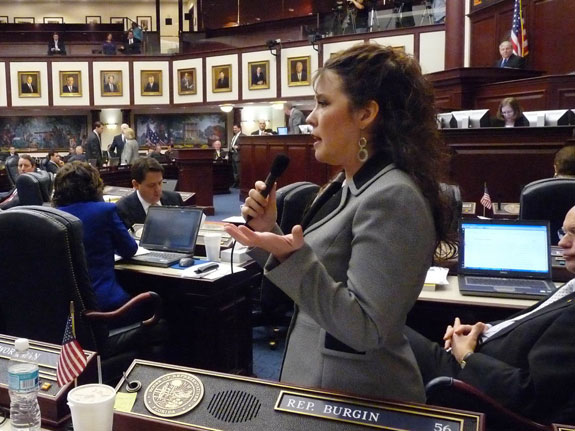
Demonstrating the influence that the American Legislative Exchange Council has had over Florida lawmakers, Rep. Rachel Burgin, R-Riverview, in November 2011 left ALEC's mission statement on a resolution calling for the federal government to reduce corporate taxes. (House photo by Mark Foley.)
By Howard Goodman
Florida Center for Investigative Reporting
A liberal group is urging Florida lawmakers to sever ties with the American Legislative Exchange Council (ALEC), the organization that helped spread Stand Your Ground and voting-restriction laws to dozens of states.
“ALEC represents what is essentially an unelected, shadow Legislature in Florida,” Mark Ferrulo, executive director of Progress Florida, said in a press release today. “Responsible lawmakers should disavow the group’s extremist and secretive influence on Florida law making.”
This is a bad week for ALEC. At least 10 of its major corporate sponsors — including Coca-Cola, Pepsi, McDonald’s, Kraft and BlueCross BlueShield — have fled the organization. They couldn’t have liked the glare of publicity caused by the Trayvon Martin shooting or the pressure from critics like the liberal group Color of Change, which had urged an end to “corporate-funded voter suppression.”
In a startling about-face, ALEC announced yesterday it was ending its Public Safety and Elections task force, “and reinvesting these resources in the task forces that focus on the economy.”
This is a big deal. This now-abandoned task force was responsible for many states adopting laws favoring gun-owners like Florida’s and for voting-law changes that might prevent millions of citizens — mainly minorities and the poor — from voting this year.
Working for almost 40 years outside the public’s gaze, ALEC has hosted meetings between state legislators and corporate lobbyists to write legislation designed to advance business interests — what ALEC calls “pro-growth, solutions-oriented ideas,” but what Progress Florida calls “an extremist, global corporate agenda.” ALEC constructs “model legislation” that can be exported and passed in state after state.
ALEC has become best known for spreading the Stand Your Ground law, which widely broadened the concept of self-defense, despite the misgivings and warnings by law-enforcement professionals such as former Miami Police Chief John Timoney, who recently lamented that “the law has been used to justify killings ranging from drug dealers’ turf battles to road rage incidents.”
But the Florida legislators have introduced many other ALEC-inspired — sometimes ALEC-written — bills, Progress Florida noted. These include the controversial Parent Trigger bill, which would have enabled parents to demand sweeping changes at under-performing schools; the massive prison-privatization plan; proposals to crack down on illegal immigration; and a bill to reject money for expanding health care for children and seniors. All those bills failed in the recently completed legislative session.
In November 2011, Rep. Rachel Burgin, R-Riverview, actually left ALEC’s mission statement on a resolution calling for the federal government to reduce corporate taxes.
ALEC’s startling retreat on its gun-rights and vote-suppression efforts “was a de facto admission of extremist policy-making gone wild,” Ferrulo said. “Florida legislators need to decide whether they represent main street Florida or the corporate board rooms that will continue to fund ALEC and its anti-middle class economic agenda.”
“The corporations abandoning ALEC aren’t explicitly citing the Stand Your Ground statutes as the reason for their decision,” the New York Times wrote in an editorial. “But many joined the group for narrower reasons, like fighting taxes on soda or snacks, and clearly have little interest in voter ID requirements or the N.R.A.’s vision of a society where anyone can fire a concealed weapon at the slightest hint of a threat.
“In a statement issued on Wednesday [April 11], ALEC bemoaned the opposition it is facing and claimed it is only interested in job creation, government accountability and pro-business policies,” the Times editorial continued. “It makes no mention of its role in pushing a law that police departments believe is increasing gun violence and deaths. That’s probably because big business is beginning to realize the Stand Your Ground laws are indefensible.”
